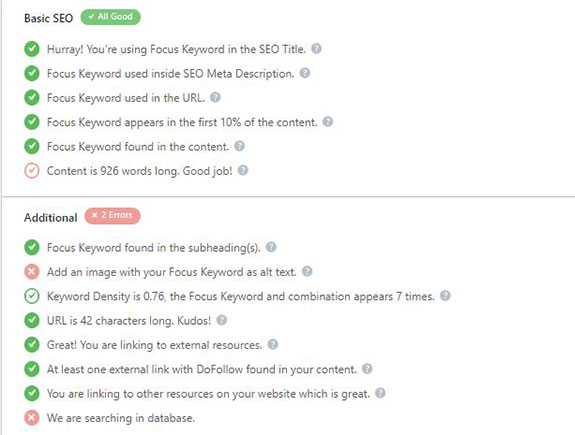(Part 2)
You don’t have to be a professional content writer to distinguish a good copy. If you have ever researched any term or group of terms on Google and managed to find the text that really helped you – we can only congratulate you, as at that very moment you figured out how it feels to find good content on the Internet. It is something that doesn’t happen every day.
We wrote about the great content in one of our previous blog posts, where we also shared some of the most important yet basic tips you should apply to the content you create for your website. These tips are enough for initial content fixing, but to rank your site even better on Google, it is needed to advance your SEO knowledge even more and implement it in content writing.
That’s why we decided to share more tips with you, all of them based on our vast experience. Our team believes sharing is essential, so we dedicated this blog post to tips on advanced content creating and editing on your website.
Before we start with the tips, we would like to emphasize the following – though good content attracts clicks and keeps people on the site, it can do much more. A good copy should answer someone’s questions, even the ones your site visitors never thought of. In conclusion, the best content doesn’t bring only clicks, it also brings trust, which leads to more shares, backlinks, and sales.
Why should small businesses recognize the value of content writing?
A good content writer could be the most valuable part of human resources in one small company. In one of our blog posts, we wrote about the importance of having a content writer in your team, because a content writer tells a story about a brand, and describes all the benefits of products and services potential clients could have.
Based on the studies, buyers appreciate certain brands three times more if they trust the content published on social media or websites. People trust content more than the company’s employees. Up to 97% of people responded that bad content has a negative impact on the perception of any brand.
Nobody wants to waste tons of hours spent researching keywords and writing content, so if you want to get ROI, remember our text or made a note about the following list of tips.
- Always start the writing process by researching keywords for SEO
- Overwhelming text with keywords will never give good results
- Don’t forget to apply good SEO tips
- Be careful with buzzwords
Never edit your own text, or at least, don’t do it simultaneously with writing.
1.Content writing starts with keyword research
Before you start writing, you need a topic, so you can solve two tasks within one process – combine optimization for search engines and planning posting calendar.
Researching keywords provides information about topics, Google and your target audience find relevant.
Research can help you discover the content strategy of your competition, as well as the pros and cons of your own strategy. Also, researching keywords can help you optimize each website text individually, and to check your own strategy, and make changes (if needed) to increase website traffic.
2.Be careful with the number of used keywords
You should insert keywords in your texts so they get an additional value. This will increase readability, and chances to get a higher ranking. Also, if you overwhelm the texts with keywords, it simply doesn’t reach any of the goals we listed.
Neither Google nor readers will get the content seriously if it has too many keywords. This will lead to a decrease in conversions, and views of the pages. Over time, readers will get an impression the site is of low quality, the bounce rate will jump, and the search engines will push your page to the bottom. This is a scenario nobody would wish for.
Search engines have advanced in the past few years so it is not easy to cheat them. In other words, don’t use wrong grammar if your users do it – it will become too obvious. Also, there is no need to use every single synonym related to your keywords, so Google can understand the main focus of your page and business.
3.Don’t forget the SEO tips that provide results
Repeating keywords in the text is not enough as keywords and phrases should be implemented in titles, subtitles, URL, meta description, and images descriptions. Luckily, there are various extensions and tools that could help you. Keyword density is a parameter that reveals how successful you are in fitting keywords into the content.
If your site was done in WordPress, then a Yoast extension could be very helpful in optimizing texts. It is very intuitive, once you learn how to use it (it won’t take too long) it will become your best friend and an excellent indicator of how well you optimize your texts.
If you open the analytics of this extension, you will see what you did well and what has to be changed, just below the text you intend to publish. You will see the result for the keyword density, if you missed inserting the main keyword into the meta description, etc.
Take a look at one of Yoast’s analytics.
4.Be Careful with when and how much you use buzzwords
Don’t use pretentious words, always try to write something equally simple and understandable. If you think your audience will have a different perception of you and think you are so smart – they won’t. Maybe your approach will even annoy them. It is the same case with words we often hear in everyday speech, i.e. slang. They could be an interesting addition to the text, and jazz it up a bit, but don’t exaggerate.
Don’t forget the most important thing: You are not writing for your own sake, but for your target audience.
The terminology used in a certain niche could be very useful and important for SEO, as it simultaneously could make the content clear but also authoritative in the eyes of your target audience. If a text sounds too professional and only a few people can understand it, can we consider that text as well written or it’s just understandable to people from that narrow niche?
Always ask yourself if the majority can understand your text. If you can understand the text, if there are no pretentious words used to add the aesthetic value but not to produce clear content, then it is real merit and good text readers will surely understand.
5.Don’t edit the text yourself
Ideally, the editor should be in charge of checking your text. But it is often not the case, and usually, one person is responsible both for writing and editing. In that case, it is recommended to write a copy or a blog post without going back to certain parts, just let the idea flow without editing, and then come back to a raw version after a couple of hours (or, even better, tomorrow).
Of course, it is always great to have a backup person to check grammar, spelling, etc. After this first editing step, it’s time to check all facts and terminology (especially if you are writing for a specific niche). Only then we can consider the text is ready for publishing.
We sincerely hope you consider our tips from this blog post and from the previous blog post as useful, and that you have really learned something new about content writing and text optimization for search engines. If you think you would need professional help, contact us and we will create a content strategy tailored based on your requirements.
If you need more tips for small businesses, it would be great to read our texts about digital marketing, graphic and web design on our blog page Also, feel free to share your text with friends and colleagues.



















